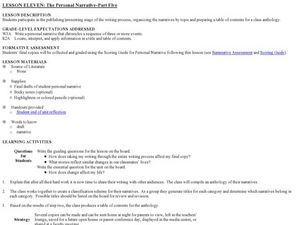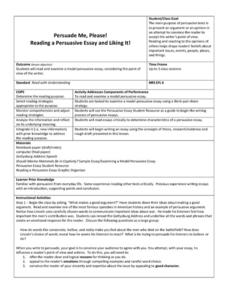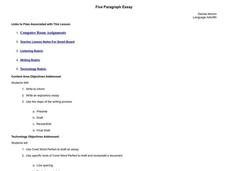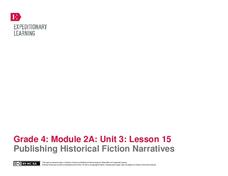Curated OER
Identifying Personification in Poetry
Improve your young poets' descriptive writing with this lesson on personification. A SMART board and PowerPoint presentation guide your class through the process of identifying human qualities attributed to various non-human objects. A...
Curated OER
The Personal Narrative - Part Five
Create a class anthology with your young writers. In this personal narrative lesson, each writer reflects on actions and events from their own lives and chronicles them in a three-part written sequence. They create a table of contents...
Curated OER
Talking Sticks Literature Circle
Following the six-step process for a talking sticks literature circle, group members choose a leader for the discussion, summarize the reading, discuss journal entries and questions, set reading goals, and write reflections. I think this...
Curated OER
A More Perfect Union: The Story of Our Constitution
Sit back, relax, and transport to 1787! This lesson on the Constitution begins with guided imagery of the Constitutional Convention. The class reads A More Perfect Union: The Story of Our Constitution in an...
Curated OER
Noncombatancy and the Seventh day Adventist Church
Upper graders investigate how the Seventh Day Adventists are objectors to the practice of war. The instructional activity covers the Civil War and examines the church's position about the practice of war. The research extends to modern...
Curated OER
I'm a Changed Pig
Introduce your class to fairy tales with this instructional activity. After reading the fractured fairy tale, "The Three Little Wolves and the Big Bad Pig," third, fourth, and fifth graders write a personal narrative as a response to the...
American Documentary
The Benefits and Drawbacks of Plea Bargains
The outcome of 90 percent of criminal cases in the US is determined by plea bargains. Clips from the documentary Better This World create the backdrop for an investigation of the benefits and drawbacks of the plea bargaining process....
Curated OER
Rudyard Kipling's Rikki-Tikki-Tavi: Mixing Words and Pictures
Create meaningful illustrations to accompany stories in a web-based art and literacy lesson focused on "Rikki-Tikki-Tavi" by Rudyard Kipling. The class takes a virtual art safari with the Museum of Modern Art and then discusses how...
Curated OER
Analyzing Verb Use: Part 2
With the Wordle ap in one hand, and their favorite writing piece in the other, 3rd graders analyze their verb usage. They select a piece they have written, type it into Wordle, then analyze their word choices and alter them using synonyms.
Curated OER
Persuade Me, Please! Reading a Persuasive Essay and Liking It!
Persuade your writers that crafting arguments is not that difficult. They only need to follow the steps outlined in this resource.
Curated OER
Schoolyard Field Guide
Fourth graders observe, plan, research, and create a field guide for the trees that are in their schoolyard. In this trees lesson plan, 4th graders make careful observations of what they see around their school and create a guide.
Curated OER
Introduce Writing a Letter
Students explore the process of writing by participating in an early writing activity. In this alphabet letter lesson, students utilize a pencil for the first time and identify the proper grip for writing. Students utilize their pencils...
Curated OER
Research and Technical Writing
Students summarize information from their research on to note-cards. In this technical writing lesson students examine examples of note-cards that contain main ideas from research previously conducted. They will then compose their...
Curated OER
Peer writing evaluation (myth)
Students compose myths. In this creative writing lesson plan students use their knowledge of the features of myths to compose their own, then share with a peer for feedback.
Curated OER
Leads for Descriptive Writing
Students write two descriptive leads to learn how to reel in readers. After their leads have been written, they will share with a partner to decide which was the most appealing. In this leads instructional activity, students can also...
Curated OER
Abuela's Weave Teacher's Guide
Students read and response to the book, Abuela's Weave. In this African-American literature lesson, students discuss pre-reading questions, that focus on family traditions and make predictions about the text. Students read the text and...
Curated OER
Paragraph Writing
Third graders receive Gummi hamburgers. They discuss parts and structure of a (real) hamburger. Students dissect the gummi hamburger and rearrange the pieces. Students discuss the problems that would be caused by this with a real...
Curated OER
Greek Inquiry Report and Presentation
Sixth graders choose from a list of researchable inquiry questions. They engage in all phases of inquiry/research process.
Curated OER
Books on Trial
Sixth graders persuade classmates that their favorite book is the best book ever written. In this persuasive writing instructional activity, 6th graders create a written argument as to why their favorite book is the best. Students...
Curated OER
Five Paragraph Essay
Eighth graders are introduced to the mechanics of writing a standard-form essay. They draft, edit and polish a five-paragraph essay about spending the day as an animal of their choice.
Curated OER
Creative Writing
Eleventh graders write a persuasive letter to the editor using the writing process.
Curated OER
"Write-a-Letter-to-the-Teacher" Book Report
Students practice writing a friendly letter to the teacher as a method of reviewing a book. They write a three paragraph report on a book that they read in friendly letter format.
EngageNY
Publishing Historical Fiction Narratives
Class members discover what it means to publish their works. Working on a computer, young writers use an online dictionary to edit their spellings and conventions based on the information added to the rubric. From here, and most of the...
Curated OER
Fourth Grade Language: Research Process
In this review of fourth grade resource usage worksheet students answer questions about guide words, library database, resources for specific information, parts of a book, and dictionary usage. Students answer 10 questions.

























